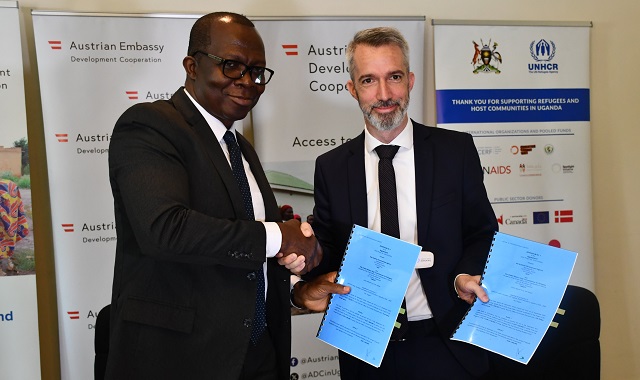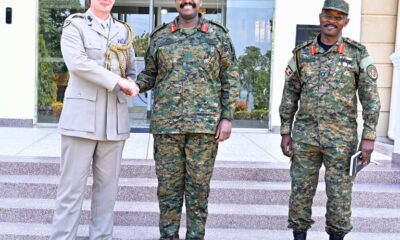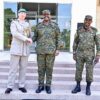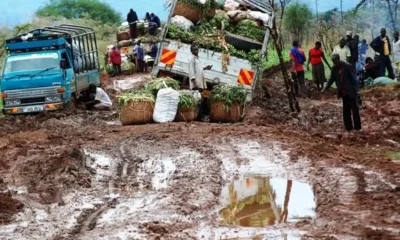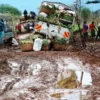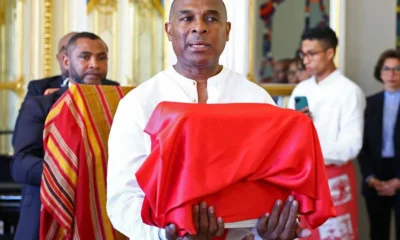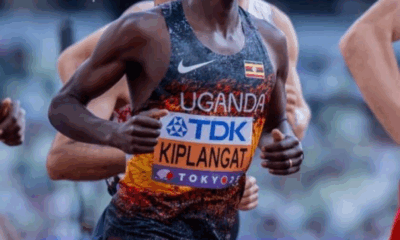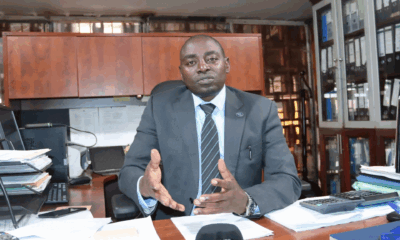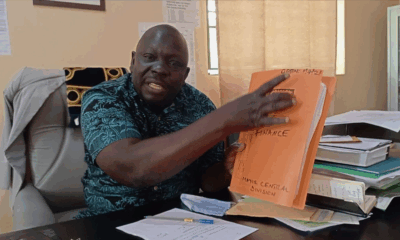News
Austria Pledges UGX 6.7 Billion to Improve Water and Sanitation in Uganda’s Refugee-Hosting Districts
Uganda’s refugee-hosting communities are set to benefit from a significant boost to water, sanitation, and hygiene services following a UGX 6.7 billion (USD 1.8 million) pledge from the Austrian government. The funding comes amid mounting humanitarian needs and dwindling donor resources, with the United Nations High Commissioner for Refugees (UNHCR) warning that only 25% of required funds for refugee support have been secured this year.
The announcement was made during a signing ceremony in Kampala between Matthew Crentsil, UNHCR Representative to Uganda, and Bernd Brunner, Managing Director of the Austrian Development Agency, who is on a working visit to Uganda.
Uganda currently hosts nearly 1.9 million refugees and asylum seekers — the highest number in Africa — and is projected to surpass 2 million by next year. These populations are mainly from South Sudan, the Democratic Republic of Congo, Burundi, Somalia, and Eritrea, fleeing conflict, persecution, and climate-induced crises. Yet, continued funding shortfalls in 2024 have left critical sectors like water, sanitation, education, and healthcare severely under strain.
Crentsil noted that Austria’s contribution will directly address urgent water and sanitation needs, which are essential to preventing disease outbreaks and maintaining human dignity in crowded settlements. “Improving access to safe water and sanitation is now more critical than ever for protecting health and preserving human dignity, especially amid growing humanitarian needs and widening funding gaps,” he said. “We are grateful to Austria for this timely and flexible support that will help bridge urgent WASH gaps in refugee-hosting communities.”
Impact of the Funding
According to UNHCR, the UGX 6.7 billion will be used to construct and expand solar-powered water infrastructure to ensure reliable, sustainable access to safe water. Provide emergency drinking water for 40,000 newly arrived refugees.
Build 960 communal latrines and showers to improve sanitation and reduce open defecation risks. Operate and maintain 150 motorised water systems and 647 boreholes across settlements, and maintain 6,000 VIP latrines in use by refugees and host communities.
The intervention is expected to raise WASH (Water, Sanitation and Hygiene) coverage in refugee settlements and surrounding communities from 45% to 65%, directly benefiting 1.44 million people — including nearly half a million refugees and members of host communities.
Frank Walusimbi, UNHCR’s Associate Communications Officer, said that without this boost, improving conditions in settlements had become almost impossible due to chronic underfunding. This latest commitment follows Austria’s earlier contribution of USD 2.7 million in January 2024, reflecting a growing partnership between Austria and Uganda in humanitarian and development cooperation.
Bernd Brunner praised Uganda’s long-standing generosity toward refugees, noting that their support will focus on inclusive services and strengthening systems that uphold dignity, health, and opportunity. “Behind every statistic are real individuals, children, parents, and families striving to rebuild their lives,” Brunner said. “Our goal is to ensure that the services they access not only meet immediate needs but also lay foundations for a dignified and self-reliant future.”
A Growing Challenge
Despite Uganda’s progressive refugee policies — which grant freedom of movement, the right to work, and access to public services — resources remain stretched thin. Local governments in refugee-hosting districts face increased demand for water, schools, healthcare, and livelihood opportunities, often without proportional increases in funding.
UNHCR has warned that unless funding improves, vital services will be scaled back, increasing risks of disease outbreaks, malnutrition, and social tensions between refugees and host communities.
Austria’s funding is expected to ease some of these pressures while also aligning with Uganda’s National Development Plan III, which emphasizes integrated refugee and host community support under the Comprehensive Refugee Response Framework (CRRF).
Comments



